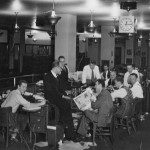Standing on the Shoulders of a Giant
The uncompromising legacy of George Bain, Canada's first national affairs columnist
Updated: January 5, 2011 1:12a.m.
By 1973, George Bain was restless. He’d been writing The Globe and Mail’s Ottawa column since 1964, and though he’d covered a fascinating, occasionally tumultuous, time in Canada’s political life—including the 1967 Centennial, Trudeaumania and the War Measures Act—he was up for a new challenge. Globe editor Richard “Dic” J. Doyle didn’t want to give him a managerial position because he worried that the meticulous Bain would be far too demanding of reporters who weren’t up to his expectations. He promised the columnist the Asia bureau, though not for a year. In no mood to wait, Bain left the paper.
But first, he wanted to write a farewell column. This put Doyle in a bind, because he didn’t want the columnist’s goodbye to disrupt a smooth transition to Geoffrey Stevens, who would be taking over the most prestigious piece of real estate in a Canadian paper: the bottom left corner of page six, right under the Globe editorials. So Bain’s farewell never ran, and his abrupt disappearance surprised some readers, including one of the most powerful in the country. Shortly after Bain’s column vanished, Doyle opened a letter from Pierre Trudeau, a prime minister the columnist had not been afraid to criticize. It read, “Where in the hell is Bain?”
The man who wrote “the most important column in Canada,” according to 30-year Toronto Star veteran Val Sears, plowed through the jargon and policy mazes of politics better than any of his colleagues. He offered readers his sharp analysis and wit, plus a few fictional characters and some poetry, up to five days a week. Allan Fotheringham, who owned the back page of Maclean’s for decades, called him the “pre-eminent columnist in the land” in 2001. And when CBC Radio giant Peter Gzowski was once asked if he had read Bain, he responded, “Do Catholic priests read the Bible?”
Bain, who died in 2006, later circled around to take on his own kind, attacking journalists and journalism in his book Gotcha! How the Media Distort the News. “George was not a man who would compromise,” says Clark Davey, who began his career alongside Bain. “He believed in his own rightness, and that’s what made him a difficult employee to deal with.” But that’s also what made him so good. He didn’t just write the first modern national affairs column in the country; he left a legacy of high standards for those who followed: Stevens, until 1982; Michael Valpy, until 1984; and ever since, Jeffrey Simpson. Today Simpson says, “I’ve always felt I’ve stood on Bain’s shoulders.
In 1936, when Bain dropped out of high school at 16 to work as a Star (then The Toronto Daily Star) copy boy for $6 a week, the editor told him to finish the school year and come back to him in the summer. But when Bain showed up again, the editor was on vacation. So he walked over to the Toronto Telegram, where he made $2 a week more than he would have at the Star.
After serving in the Second World War, he joined the Globe as a reporter and was later assigned to Queen’s Park to cover Ontario politics. William French, a general assignment reporter at the time, first noticed Bain’s ability to sift through dense commission reports while co-writing a story that examined the future of education in the province. Bain’s success following provincial politics led to a posting in the two-person Ottawa bureau in 1952, where his humour and ability to dissect government policy and spot inconsistencies garnered him respect within the political realm—and the encouragement of readers. He earned the right to contribute to page six as result of his perceptive eye and his strong voice. His first few opinion pieces were received so well that, starting in 1954, Bain’s column regularly filled the inches beneath the paper’s editorials.
The press gallery offices in the 1950s buzzed with energy. Papers flew, reporters shouted and the air was thick with cigarette smoke. Davey marvelled at Bain’s ability to write a piece in one shot without any interruptions—except when his nervous stomach occasionally caused him to vomit while covering especially significant events. He was a man so forceful in his convictions, his body physically responded to the stress of writing controversial columns.
But the mark of a great political columnist isn’t writing an astounding piece about a major event, but writing an interesting one about a tedious policy debate. In a column about the finance minister’s speech at the Canadian Tax Foundation’s annual dinner, Bain quipped, “One suspects that in time Mr. Walter E. Harris will grow to hate the day he decided to play the roguish role of the Barefoot Finance Minister.” The column critiqued Harris’s glib characterization of the Canadian taxpayer, but did so with humour and flare: “Maybe in delivery he had some way of marking the funry [sic] bits, like snapping his braces, but they didn’t come through in the print. What did come through was some very promising talk about tax cuts.”
Better known for his acerbic tone and biting rebuttals, Bain didn’t mind praising those who deserved it. While describing a heated attack by Progressive Conservative MP E. Davie Fulton on the governing Liberals’ national-unity strategy in 1955, he wrote, “The 38-year-old British Columbian is one of the Conservatives’ best men in a debate—in fact, one could say one of the Conservatives’ best men, period—and this time he gave it both barrels.” His description of Fulton’s attack is concise, engaging and witty: “The target of some of his best shots was the myth which the Liberals long have cultivated with the most loving care, the myth that national unity is safe only in Liberal hands and that they have a frequently desperate time protecting it from all sorts of would-be violators.” This observation, like many of Bain’s, rings true today.
In 1957, Bain suspended his column and left Ottawa to open the Globe’s first London bureau, a base that covered Europe, Africa and the Middle East. Three years later, he moved to Washington, where he remained for four years. While there, he travelled to Oxford, Mississippi, to cover a watershed moment in the civil rights movement: James H. Meredith’s enrollment in the University of Mississippi, which made him the first black man to attend the school. A fifth of the 5,000-person student body swarmed the campus in protest and President John F. Kennedy provided federal marshals to protect the young Meredith. As the mob grew violent, the marshals resorted to tear gas. Bain heard rumours that two people had died in the scuffle, so he followed up with the local hospital, where the staff implied the deaths were natural. After some “prodding,” Bain learned that one of the deceased was actually French journalist Paul Guihard, who’d been shot while covering the spectacle at Ole Miss.
The Globe was the only Canadian publication to run extensive coverage of Guihard’s death. Doyle was astounded that The Canadian Press had nothing on the killing and wrote what he called “a snarky letter” to Gillis Purcell, CP’s general manager, to complain: “We think [CP’s reporting] was pretty thin and in a couple of spots it was woefully lacking.” When he learned of the correspondence, Bain responded with a letter to Doyle that was characteristically sharp: “I should have thought that there would be a predisposition to say that the staff man had done a good job rather than that the agencies had done a bad one.”
On returning to Ottawa and page six in 1964, Bain acted on his belief that reporting took much more than a beer with some buddies. His voice, already strong during his first stint in the nation’s capital, had grown while he was abroad. In the ’50s, his column often wavered between paraphrasing debates and analysis; now, his opinions were clear and his voice truly apparent. On early proposals for a Canadian constitution in 1968, he wrote, “The federal Government’s approach to the matter of the individual rights which it thinks ought to be imbedded [sic] in the Canadian Constitution is, to say the least of it, intriguing. So far as these rights are concerned, it is offering a sort of cafeteria Constitution.”
Bain would read documents and talk to people to collect facts and crosscheck them. Simpson, who has a bleak view of columnists today, laments, “This kind of work is now considered hopelessly old fashioned in the columnist’s trade, where impressionistic who’s up and who’s down stuff passes for analysis.” David Hayes, author of 1992’s Power and Influence: The Globe and Mail and the News Revolution, noted other journalists cultivated cozy relationships with sources in the major political parties, enjoyed private briefings and tended to fraternize with the bureaucrats who ran the growing federal civil service. But Bain refused to socialize with the people he covered. “He felt reporters couldn’t learn as much if they were insulated in ivory towers, writing about their pals,” Hayes wrote. Simpson agrees: “George liked political people, but never got too close to them. He respected what they did without being obsequious. George was an outsider.”
Bain also set himself apart from the pack with what he wrote, not just how he covered the Hill. The most notable examples were his satirical columns set in a fictional Saskatchewan town that he later collected in a book called Letters from Lilac. He parodied the serious and the silly alike. In one 1967 letter about an American study that found women who enjoy food had a larger appetite for sex, he joked that the owner of the local diner “said I could I quote him as saying that this news from Boston promised great things for the love-life of fat girls, and his special for Tuesday was pot roast with mashed potatoes and gravy.” In another Lilac piece, a poke at the fight to take the West in the 1968 federal election, Bain ridiculed the number of politicians campaigning in the province: “Last Friday night there were so many planes in the sky, three people phoned The Lilac Advance to find out if World War Three had started.”
John Godfrey, a former journalist and politician who was later president of the University of King’s College, where Bain taught from 1979 to 1985, views Bain as “very much the observer” outside the bubble of politics. “Bain’s strength was poking holes in political policy and politicians,” and the job of politicians was to solve the problems he pointed out. Bain explained his take on politics in his 1972 book, Canada’s Parliament. “Reverse the positions of the parties, as elections sometimes do, and what had been simple mulishness becomes responsible opposition, and what had been naked dictatorship becomes merely a proper urgency to get on with the essential business of the nation.” Bain, a man of conviction, wavered between respect and disdain for the politicians he covered. David MacDonald, a former Globe colleague, says, “The more George knew about politicians, the greater his contempt was because there were a lot of, well, let’s say, unexceptional men in politics and government.”
Sometimes his contempt grew for the exceptional politicians as well. Initially, Bain respected Trudeau, but that changed when he saw how the prime minister handled the 1970 October Crisis. The Front de libération du Québec kidnapped British Trade Commissioner James Cross and Quebec’s Minister of Labour and Immigration Pierre Laporte (eventually executing the latter). Trudeau responded by introducing the War Measures Act, which brought armed troops to the streets of Ottawa and Quebec. Bain fired back with a column denouncing the decision: “No one is likely to argue that it is not important to maintain law and order in society…. But it does not follow that the inescapable choice is between doing nothing and posting soldiers with rifles and machine guns in the doorways of Parliament.”
Bain and Trudeau made an excellent duo for challenging newspaper conventions in 1971 when the PM’s “four fearsome letters,” as Doyle put it, appeared in the Globe. After Trudeau mouthed the words “fuck off” in the House of Commons—which came to be known as the fuddle duddle incident because of Trudeau’s ambiguous explanation—the Globe printed what could have been a whole new word, judging from the reaction. In a column called “Rich Kid Syndrome,” Bain began: “John Lundrigan … was up, asking a question about unemployment, and the Prime Minister, sitting in his place, front and centre, mouthed at him the words Mr. Lundrigan read to be: ‘Fuck off.’” Bain argued that “it does seem to me to say quite a bit about the character and attitudes of the man who is prime minister. Therefore it is part of parliamentary reporting to report it.” But outraged readers didn’t see it that way, and Doyle made it clear that Bain hadn’t set a precedent and that any future use of the fearsome four would have to be cleared with the managing editor, because theGlobe was “still a family newspaper.”
After Bain left the paper in 1973, he took a job as editorial manager at the Star. But his restlessness soon caught up with him again. “Writing editorials is like wetting your pants while wearing a blue serge suit,” he once said. “Nobody notices and it leaves you with a warm feeling.”
In 1980, Bain lived in France for a year and wrote Champagne Is for Breakfast, a book about wine, on which he was an expert. In 1982, Godfrey, then the president of King’s College, chose Bain as the director for the school of journalism. The oenophile carried his taste for the finer things to the home he built in Mahone Bay, Nova Scotia, where his basement included a cellar for his collection of vintages. Over the next two decades, he continued to write from the picturesque seaside town and a pied-à-terre in France, and resumed a column in the Globe on a weekly basis in 1981.
When Norman Webster replaced Doyle as Globe editor in 1983, the shift in power sparked a souring of Bain’s outlook on journalists that would culminate with Gotcha! Webster killed his column—for good. But no one gave Bain the news straight to his face, so he wrote an infuriated response to Webster and received a reassuring letter that his column would continue, but that it would be a good idea to end it gradually. Never one to compromise, Bain wasn’t satisfied. So, when he sat down to write what was to be his last column, he penned a farewell. Once again, the Globe’s editorial hierarchy refused to run it. This time, though, Bain was not willing to simply disappear, and his farewell ran in the Toronto Sun instead. He concluded what he estimated to be over 3,000 columns with “Clyde Gilmour’s customary sign-off to his admirable program of recorded music, weekends on CBC Radio, ‘So long for now.’ I’ll be seeing you around. But not here, not here. And again, thanks for writing.” His last line was a gentlemanly nod to his readers’ many letters, and underscored the finality of his departure from a paper that had published his writing, on and off, for over 30 years. It was also classic Bain: serious but playful, stubborn but fair, caustic but kind, and doggedly devoted to the facts.
This punctilious nature didn’t just colour his professional life. His son Chris now recalls relaxing in the garden one calm afternoon when Bain told him he’d planted 50 cedars the other day in his yard. “I thought nothing of it,” says Chris, but days later his father apologized for misleading him, and explained that he had planted only 47 trees.
Given his hyper-attention to accuracy, perhaps it was inevitable Bain would have some blunt words for his own kind. Gotcha!, published in 1994, argued the driving force behind journalism is to catch politicians in the act like tattletales. Bain critiqued town hall–style election coverage, the press gallery’s unrelenting appetite for scandal and many reporters’ antagonism toward politicians.
Then-Senator Doyle blurbed the book as “immensely readable. It has style and wit of course, and plot enough to stake a novel.” But reviews were not often positive. Hayes wrote one called “Bluster and Blame from the Old School Gotcha” for the Globe. A long-time admirer of Bain, Hayes said many of the book’s observations rang true and it did make sound contributions to media criticism. But he also noted its sweeping generalizations, wonky arguments and woolly interpretations. And he complained that “Bain’s writing has a dyspeptic, bitter tone, like a father lecturing his son on the superiority of the good old days. Much of the book revolves around negative coverage of Mulroney’s Tories, which Bain attacks with the partisan zeal he criticizes in journalism at large.”
Perhaps the author knew what was coming because, in the book, he admitted, “If there is a journalistic sin catalogued in these pages that I have not committed sometime in a long career, I can only attribute the omission to oversight.”
For all the flack he received for Gotcha!, when Bain died in 2006, those quoted in his glowing obituaries remembered him for his attention to detail, wicked wit, snappy writing—and his occasionally difficult nature. In a Globe obituary, Davey recalled that “George had his view and the rest of the world could go to hell, which is a great thing in a columnist and a helluva problem in an employee.” In his 1990 book, Hurly-Burly: A Time at the Globe, Doyle recounted many of the power struggles between Bain and him, yet he stated, “Elegant is a word seldom used to describe news people, but it fits George Bain.” And perhaps Hayes captured Bain best when he wrote that Bain “combined the free-spirited moxie of the old school with the thoughtfulness and professionalism of the new.”
Iain Alec Bain is not related to George Bain.
Correction: The original version of the article stated that Pierre Laporte was Quebec’s justice minister. He was Quebec’s minister of labour and immigration. The Review regrets the error.
Iain Alec Bain was the Multimedia Editor for the Winter 2011 issue of the Ryerson Review of Journalism.












































